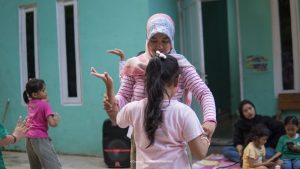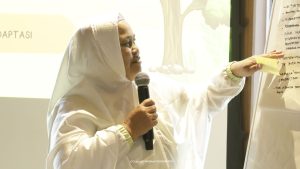Boston, 26 April – 1 May 2025 — The Jameel Community, from Saudi Arabia and the Massachusetts Institute of Technology (MIT), USA in 2017 established the Jameel World Education Lab (J-WEL MIT) as a connection point, portal and laboratory for co-creating new ideas. Every year, this Education Lab organises two workshops called J-WEL Week involving its members from higher education institutions, community-based organisations, NGOs and other organisations in various countries around the world, including Indonesia.
In 2025, J-WEL Week took place on MIT campus from April 28 to May 1, 2025. with the theme ‘Fostering Campus Innovation Pipeline’. Twenty-three participants from Greece, Latvia, Brazil, South Africa, Mexico, Peru, and Indonesia attended the annual event. However, this event was less busy than the previous year, possibly due to fluctuations in the global economy.
Wadah Titian Harapan Foundation (Wadah), an affiliate member of J-WEL MIT, was invited to participate in J-WEL Week 2025. Wadah’s team of Paula Stela Nova L, Indra Djojohadikusumo, and Vanessa Oetomo, joined other international participants in the intensive workshop. This annual J-WEL MIT 2025 event was a valuable opportunity for Wadah to learn best practices of educational innovation from one of the world’s leading institutions.
Over the course of four days, Paula, Indra, and Vanessa actively participated in various sessions designed specifically for J-WEL members, discussing how an institution can build a sustainable innovation ecosystem.

*Participants of J-Wel Week 2025
Interactive Learning Process
The workshop began with programme mapping using the framework of the American underground railway network. The Wadah team, in a group with participants from Greece, analysed the three main programmes that Wadah conducts, namely education, health, and economic empowerment. Undoubtedly, from this method, the Wadah team found many linkages in a more comprehensive and structured programme. Vanessa, revealed that the activity helped show Wadah’s programmes as a mutually supportive whole.
The next session was a presentation on the use of fishbone diagrams to analyse challenges in education. A fishbone diagram is a management tool used to identify and organise the possible causes of a particular problem or effect. This method revealed that the main problem often lies in mindset, rather than simply resource limitations. Furthermore, the lesson learnt from this presentation is that innovation starts with the way we look at a problem.


*The framework of the American underground railway network & Innovation Pipeline work
Learning from MIT Practices
A visit to the MIT Innovation Lab provides real insight into an interdisciplinary approach. Here, students from various departments work together to create solutions to real problems. A concern raised was how to utilise innovations based on advanced technology without disrupting social interactions. Indra reminded us that Wadah focuses on human empowerment, so that the technology produced can increase capacity, both in terms of human and other resources, but not to the point of negating the role of parents and the nuclear family. She was interested in hearing more about the studies and results, as the technology demonstrated in the Lab showed potential of facilitating engagement between parents and children.
Additionally, informal discussions with MIT professors also provided new perspectives. They emphasised that organisations like Wadah have the advantage of flexibility and proximity to the community. However, for large institutions, this is often an obstacle, due to administrative and bureaucratic constraints.


*The MIT Innovation Lab provides deep insights into interdisciplinary approaches
Follow-Up Plan
Returning from MIT, the Wadah team brought back a number of concrete ideas, namely to transmit the pre-assessment process to Wadah staff through internal workshops, so that the existing Wadah Universal Education Initiative (WUEI) programme can be enhanced with an interdisciplinary approach.
The Wadah team agreed that the most valuable part of J-WEL Week was not just the theory, but seeing first-hand how the principles of educational innovation are applied in practice. This experience strengthened Wadah’s commitment to continue innovating in education, with a never-ending spirit of learning.
Wadah’s participation in J-WEL Week enriches the organisation with knowledge, strategies, and a global network, and strengthens its position as an adaptive social organisation ready to face future challenges.


*Workshop for J-Wel Week 2025 activities
Author: Paula Stela Nova Landowero
Editor: Zul Herman







